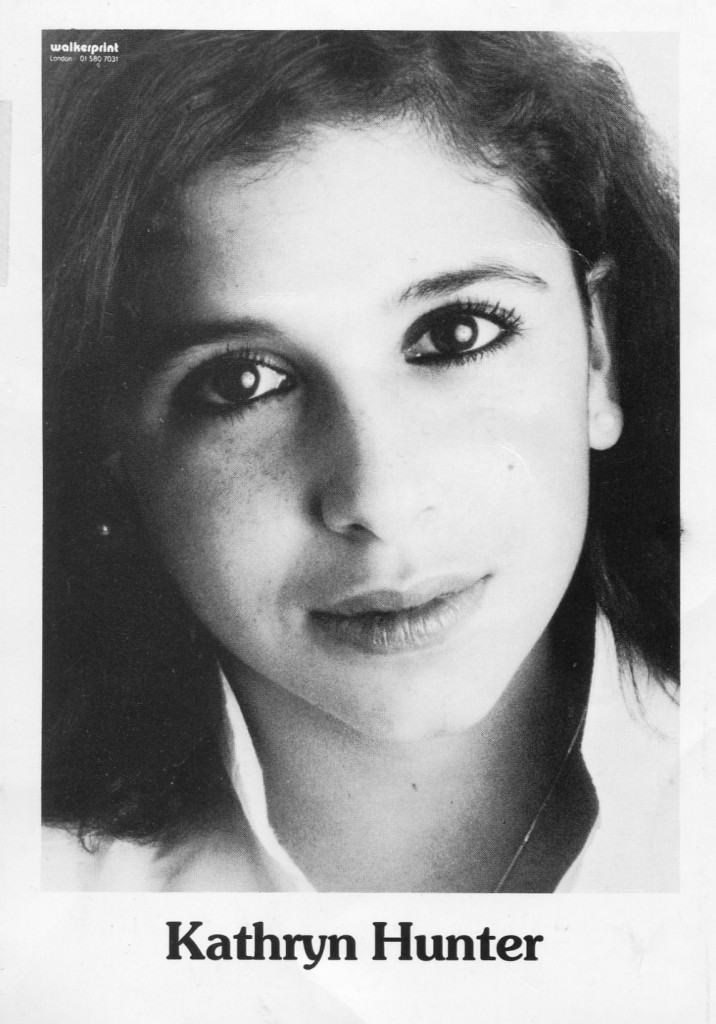
Kathryn Hunter was born in 1957 in New York City of Greek parents. She was brought up in the UK and has pursued her career in Britain. She had appeared in “Harry Potter and the Order of the Phoenix” and the TV series “Rome”.
Laura Barnett’s interview in “The Guardian” in 2013:
What first drew you to acting?
The inevitable school plays. I found doing them quite odd, but I was friends with a wonderful actor called Michele, who used to make me listen to her audition pieces. They all seemed to be about prostitutes; I found them fascinating. Later, my twin sister and I managed to avoid being married off at 18 – as was normal in my Greek family – and I got into Rada.
What was your big breakthrough?
Playing the main role, Clara Zachanassian, in Friedrich Dürrenmatt’s The Visit [with Complicite in 1989]. I got an Olivier award – but, more importantly, it felt like the coming together of the traditional training I got at Rada with a more physical, visual form of theatre. I’ve tried to bridge the gap between those two worlds ever since.
What have you sacrificed for your art?
I left it too late to have children. That was very painful, not least for my partner. But I’ve come to think there are different ways of having children, if that doesn’t sound weird – working with young people, trying to feed them intellectually.
You’ve famously played several roles written for men. Should more directors be experimental with casting?
Yes, if there’s a good reason for it – something that might illuminate the play, rather than just for the sake of it. I love seeing men play women: it’s often very revealing, and not at all like caricature.
What’s the greatest threat to theatre?
Elitism. About 20 years ago, I had this fantasy that theatre was going to become as popular as football. Now, football has become something else – something outrageous – but in theatre, ticket prices still exclude a lot of people.
Which artists do you most admire?
Those working in unsung art forms, like synchronised diving andacrobalance. For me, their commitment and poetry of movement is every bit as articulate as “To be, or not to be”.
What work of art would you like to own?
If somebody insisted on giving me Van Gogh’s Sunflowers, I wouldn’t say no.
What’s the worst thing anyone ever said about you?
That I’m selfish. It’s a valid accusation, though I try to strike a balance. I’m with Margot Fonteyn, who said, “Take your work seriously, but don’t take yourself seriously.” Those are good parameters of selfishness.
Is there anything about your career you regret?
I’m often hitting myself on the head going, “Why didn’t I leave a situation earlier, or get my shit together?” But I also believe in what [Samuel] Beckett famously said: “Fail again. Fail better.” That’s what’s glorious about theatre: you can always have another go.
In short
Born: New York, 1957.
Career: Film and TV include Harry Potter and the Order of the Phoenix and Rome. Has worked at most of the UK’s major theatres, and with companies such as Complicite and Told By an Idiot. She directs their latest show, My Perfect Mind, at the Theatre Royal Plymouth until Saturday; then touring.
High point: “Playing King Lear. I hope I get to do it again.”
Low point: “Some periods of depression early on.
The above “Guardian” interview can be accessed online here.


